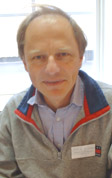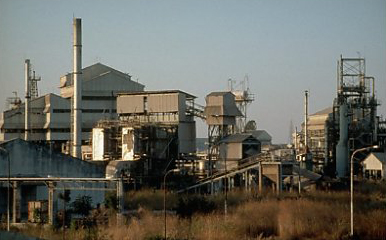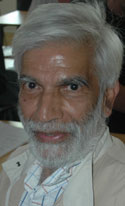SWEDISH SOUTH ASIAN STUDIES NETWORK
Department of Conservation, University of Gothenburg
Postal address: Institutionen för
Kulturvård, Göteborgs universitet, Box
130, SE-405 30 Göteborg, Sweden
Visiting address: Guldhedsgatan 5A
Web page, Dept. of Conservation: http://www.conservation.gu.se/
Web page, Heritage Studies – University of Gothenburg area of Strength initiative: http://www.science.gu.se/english/research/prominent-research-environments/areas-of-strength/Heritage_Studies/
Contact person: Senior Lecturer Bosse Lagerqvist, phone: +46 (0)31 786 4714
The department is young and has its scope and objectives as a future oriented approach, where the overall aim is to describe the environmental, cultural and societal possibilities and limitations for our common future in a local, national and global perspective.The need for increased knowledge and understanding within the area of environmental care and cultural conservation will be increasingly obvious, resulting in demands for an increased number of professional environmentalists and conservators as well as a better awareness and understanding of environmental and cultural issues among the public.
Research connected to South Asia
 From October 2010, Dr. Jan
af Geijerstam is a guest researcher within University of Gothenburg’s interdisciplinary Heritage Studies – area of Strength initiative (Styrkeområde Kulturarv), in which the Dept. of Conservation plays an important role. The Heritage Studies initiative was launched in May 2010.
From October 2010, Dr. Jan
af Geijerstam is a guest researcher within University of Gothenburg’s interdisciplinary Heritage Studies – area of Strength initiative (Styrkeområde Kulturarv), in which the Dept. of Conservation plays an important role. The Heritage Studies initiative was launched in May 2010.
Besides Jan af Geijerstam is chairman of the Swedish Society for Industrial Heritage.
Jan has previously been employed at the Division of History of Science and Technology at the Royal Institute of Technology (KTH) in Stockholm, where he defended his doctoral dissertation thesis entitled ”Landscapes of Technology Transfer. Swedish Ironmakers in India 1860–1864” in 2004. More information on his research at KTH.
 During the past few years,
Dr. af Geijerstam has been involved in an initiative to develop a collaboration project between Swedish and Indian artists and proponents of saving industrial heritage environments in mid-Sweden (Ådalen) and in Bhopal, India. They support NGO’s and activists in Bhopal that demand from UNESCO that the Union Carbide factory in Bhopal should be declared a heritage memorial building. This is a very sensitive issue that touches upon the whole question of sustainable and environmental friendly agriculture in India vs. chemical dependent agriculture that Union Carbide/Dow Chemicals represent.
During the past few years,
Dr. af Geijerstam has been involved in an initiative to develop a collaboration project between Swedish and Indian artists and proponents of saving industrial heritage environments in mid-Sweden (Ådalen) and in Bhopal, India. They support NGO’s and activists in Bhopal that demand from UNESCO that the Union Carbide factory in Bhopal should be declared a heritage memorial building. This is a very sensitive issue that touches upon the whole question of sustainable and environmental friendly agriculture in India vs. chemical dependent agriculture that Union Carbide/Dow Chemicals represent.
During the Fall 2010 and Winter 2011, Jan af Geijerstam and the Heritage Studies group are involved in the organisation of three important conferences/seminars on Bhopal in India and in Sweden:
The ”Bhopal 2011 Requiem & Revitalization International Students' Workshop and Symposium” was held on spot in Bhopal, Madhya Pradesh, India, on 23 January – 4 February 2011. It was being hosted by the School of Planning & Architecture in New Delhi, the modern Asian Architecture Network (mAAN), India, and India section of The International Committee for Conservation of Industrial Heritage (TICCIH).
The University of Gothenburg is also a partner through its Heritage Studies – area of Strength initiative.
The workshop and symposium aimed to explore the possible transformation of the former Union Carbide factory site in Bhopal into a place of remembrance and a resource for empowering the local community. More information about the symposium. ![]()
As a preparation for the Bhopal symposium, the Heritage Studies initiative in Gothenburg organised a lunch to lunch workshop on 18–19 November 2010. The workshop was entitled ‘Multiple roles of heritage – pasts, conflicts, present time.
The case of the Union Carbide former plant in Bhopal, India: “Requiem & Revitalization”’. It aimed at discussing conflicting and difficult heritage, industrial heritage and industrialization, global and local consequences, and possible means, models and pathways for improvement of heritage practices.
 The invited speakers incuded Moulshri Joshi (photo), Partner & Principal Architect, SpaceMatters, New Delhi and Assistant Professor at the School of Planning and Architecture in New Delhi; Amritha Ballal, partner and principal architect SpaceMatters, New Delhi (and also a Master's student at the Norwegian University of Science and Technology (NTNU) in Trondheim); and Suditya Sinha, partner and principal architect SpaceMatters, New Delhi.
The invited speakers incuded Moulshri Joshi (photo), Partner & Principal Architect, SpaceMatters, New Delhi and Assistant Professor at the School of Planning and Architecture in New Delhi; Amritha Ballal, partner and principal architect SpaceMatters, New Delhi (and also a Master's student at the Norwegian University of Science and Technology (NTNU) in Trondheim); and Suditya Sinha, partner and principal architect SpaceMatters, New Delhi.
More information about the lunch to lunch workshop.
Finally, the Bhopal case wasl also presented at the 2010 autumn meeting of the Swedish National Heritage Board, that took place in Stockholm on 16–17 November 2010. The Swedish National Heritage Board (Riksantikvarieämbetet) decided to have ”The town” (Staden) as theme for the meeting, and to focus on heritage and sustainable development.
The two-day seminar was organised in collaboration with Boverket, Formas and Arkitekturmuseet.
Ms. Moulshri Joshi was supposed to speak on ”(Unwanted) Industrial Heritage as a base for Community Empowerment – Bhopal and Union Carbide”. Venue: Factory Nacka Strand, Stockholm. More information.
 Dr. Satish
Chandra worked at the Dept. of Conservation as a researcher at the
department from 2002. However, he retired in 2009 and is now working with his own consultancy firm entited Chandra Byggref AB. Hailing from India, he was working at Chalmers
University of Technology between 1985 and 2002. His research areas are lime technology, ancient
building materials, durability problems in concrete, and development of
new materials, durable in aggressive environments.
Dr. Satish
Chandra worked at the Dept. of Conservation as a researcher at the
department from 2002. However, he retired in 2009 and is now working with his own consultancy firm entited Chandra Byggref AB. Hailing from India, he was working at Chalmers
University of Technology between 1985 and 2002. His research areas are lime technology, ancient
building materials, durability problems in concrete, and development of
new materials, durable in aggressive environments.
He is very much engaged in the problem of restoration and conservation
of historical monuments in South Asia, worked as an overseas consultant
advisor for HARCA, the Historical and Archaeological Research Centre for
Avadh (a branch of the Archaeological Survey of India), and in 2003 he
published a book on ”History of Architecture and Building Materials”
(TBI Books International, New Delhi, India).
Chandra planned for an educational project
on ”Problems and Possible Solutions in Conservation/Restoration
of Cultural Heritage in India and Nepal”, with an ambition
to establish links between Sweden, India and Nepal, to help restore historical
buildings and monuments, some of them are at the verge of collapse. The
intended network will comprise of scientists, material experts and the
artisans who have empirical knowledge, which they have earned through
trial and error method. During this program, investigation of the status
of the buildings and the needs of their restoration will be discussed
with the local relevant authorities. The attention will be give focus
to the monuments outside the main towns, which have not attracted the
attention of the international organizations, like Lucknow in India and
Ghale Durbar, Lumbini, Janakpur, and Gorkha in Nepal. His partners in
India are based at HARCA in Lucknow (with Roshan
Taqui as member-secretary), and in Nepal he made contacts with
the Archaeological Survey of Nepal in Kathmandu, and its Director, the
joint secretary of Ministry of Tourism Kosh Prasad
Acharya.
In 2009, Dr. Chandra presented a paper on ”Air Pollution Emission and Global Warming”, partly focusing on research results from Bangladesh. Read the paper (as a pdf-file)
SASNET - Swedish South Asian Studies Network/Lund
University
Address: Scheelevägen 15 D, SE-223 70 Lund, Sweden
Phone: +46 46 222 73 40
Webmaster: Lars Eklund
Last updated
2011-04-27
